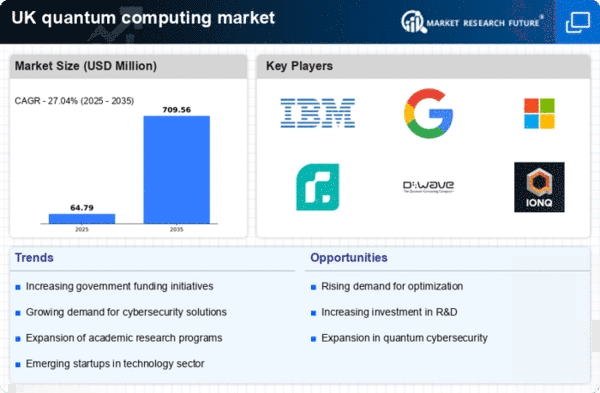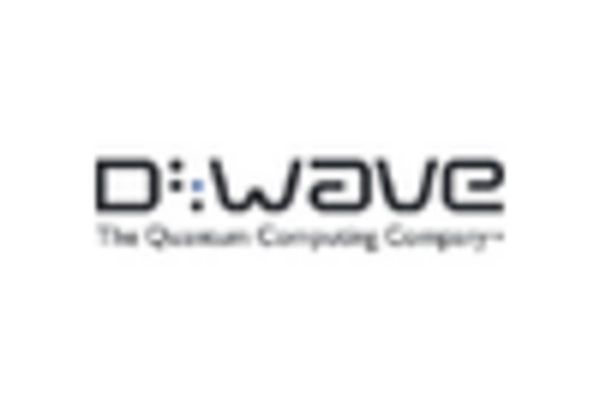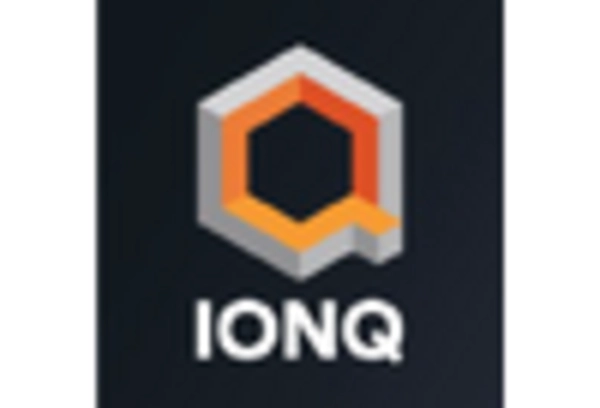Strategic Collaborations and Partnerships
Strategic collaborations and partnerships are becoming increasingly prevalent within the quantum computing market in the UK. Major technology firms, academic institutions, and research organizations are joining forces to accelerate the development and commercialization of quantum technologies. These collaborations often focus on sharing resources, expertise, and infrastructure, which can significantly enhance innovation. For instance, partnerships between universities and tech companies have led to breakthroughs in quantum algorithms and hardware. Such alliances not only foster knowledge exchange but also attract funding and investment, which is crucial for the growth of the quantum computing market. The collaborative nature of this industry may lead to a more robust ecosystem, ultimately benefiting all stakeholders involved.
Increased Focus on Cybersecurity Solutions
As the quantum computing market evolves, there is a growing emphasis on developing robust cybersecurity solutions. Quantum computers possess the potential to break traditional encryption methods, prompting a proactive response from businesses and governments alike. The UK is witnessing a surge in initiatives aimed at creating quantum-resistant encryption algorithms to safeguard sensitive data. This focus on cybersecurity is likely to drive investment in quantum technologies, as organizations seek to protect their assets from emerging threats. The market for quantum cybersecurity solutions is expected to grow significantly, with estimates suggesting it could reach £500 million by 2026. This trend underscores the critical role that cybersecurity plays in the broader quantum computing market.
Rising Demand for Advanced Computing Solutions
The quantum computing market in the UK is experiencing a significant increase in demand for advanced computing solutions. Industries such as finance, pharmaceuticals, and logistics are increasingly seeking to leverage quantum computing capabilities to solve complex problems that classical computers struggle with. This demand is driven by the need for faster data processing and enhanced computational power, which quantum systems can provide. According to recent estimates, the quantum computing market is projected to reach approximately £1.5 billion by 2025, reflecting a compound annual growth rate (CAGR) of around 30%. As businesses recognize the potential of quantum technologies to revolutionize their operations, investment in this sector is likely to continue growing, further propelling the quantum computing market forward.
Government Support for Research and Development
Government support for research and development initiatives is a key driver of the quantum computing market in the UK. The UK government has recognized the strategic importance of quantum technologies and has committed substantial funding to support research programs and innovation. Initiatives such as the UK National Quantum Technologies Programme aim to foster collaboration between academia and industry, ensuring that the UK remains at the forefront of quantum research. This financial backing not only facilitates the development of new technologies but also encourages private sector investment. As a result, the quantum computing market is likely to benefit from a steady influx of resources, enabling advancements that could lead to practical applications across various sectors.
Growing Interest in Quantum Education and Workforce Development
The quantum computing market in the UK is seeing an increasing focus on education and workforce development. As the demand for skilled professionals in quantum technologies increases, educational institutions are adapting their curricula to include quantum computing courses and programs. This focus on education aims to equip the next generation of scientists and engineers with the necessary skills to thrive in this emerging field. Furthermore, industry stakeholders are collaborating with universities to create training programs that address specific workforce needs. This emphasis on education is crucial for sustaining the growth of the quantum computing market, as a well-trained workforce will be essential for driving innovation and implementation in various industries.
















